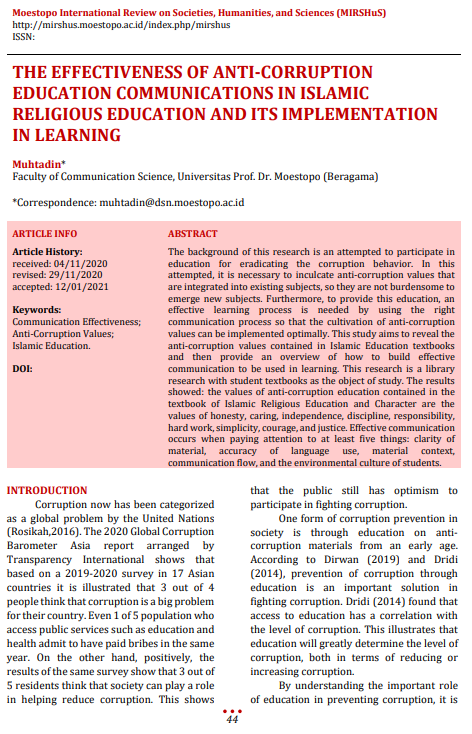THE EFFECTIVENESS OF ANTI-CORRUPTION EDUCATION COMMUNICATIONS IN ISLAMIC RELIGIOUS EDUCATION AND ITS IMPLEMENTATION IN LEARNING
Abstract
The background of this research is an attempted to participate in education for eradicating the corruption behavior. In this attempted, it is necessary to inculcate anti-corruption values that are integrated into existing subjects, so they are not burdensome to emerge new subjects. Furthermore, to provide this education, an effective learning process is needed by using the right communication process so that the cultivation of anti-corruption values can be implemented optimally. This study aims to reveal the anti-corruption values contained in Islamic Education textbooks and then provide an overview of how to build effective communication to be used in learning. This research is a library research with student textbooks as the object of study. The results showed: the values of anti-corruption education contained in the textbook of Islamic Religious Education and Character are the values of honesty, caring, independence, discipline, responsibility, hard work, simplicity, courage, and justice. Effective communication occurs when paying attention to at least five things: clarity of material, accuracy of language use, material context, communication flow, and the environmental culture of students.
References
Abdullah Hadziq Arif (2017) Zainudin dkk, (1997). Pedoman Baru Menyusun Bahan Ajar, Jakarta: Gramedia.
Birahmat, Budi, (2018). “Korupsi dalam Perspektif Al Qir’an”, Jurnal IAIN Curup,3(1). http://journal.iaincurup.ac.id/index.php/JF/article/download/457
Darajat, Zakiyah, (1998). Ilmu Pendidikan Islam, Jakarta: Bumi Aksara.
Dridi, Mohamed (2014), “Corruption and Education: Empirical Evidence”, dalam International Journal of Economics and Financial Issues Vol. 4, No. 3, 2014, pp.476-493.
Effendi, Onong Uchjana, (2004). Dinamika Komunikasi, Bandung: Remaja Rosdakarya.
Effendi, Onong Uchjana, (2005). Ilmu Komunikasi: Teori dan Praktek, Bandung: Remaja Rosdakarya.
Dirwan, Ahmad, ]](2019, The Effect of Education Against Corruption in Indonesia, OIDA International Journal of Sustainable Development Vol. 12 No. 01 pp. 53-64
Fadhil, Moh., (2019). “Pendidikan Agama Islam, Internalisasi Nilai-Nilai Anti Korupsi dan Pencegahan Tindak Pidana Korupsi”, Jurnal JRTIE, 2 (1), http://jurnaliainpontianak.or.id/index.php/jrtie/article/view/1229/628
Frimayanti, Ade Imelda, (2017) “Pendidikan Anti Korupsi Dalam Pendidikan Agama Islam”, Jurnal Al Tadzkiyah dalam Moraref, 8 (1). https://www.researchgate.net/publication/330518887_Pendidikan_Anti_Korupsi_Dalam_Pendidikan_Agama_Islam
Indawati, Ninik, (2015), “The Development of Anti-Corruption Education Course for Primary School Teacher Education Students”; dalam Journal of Education and Practice Vol.6, No.35, 2015.
Minarti, Sri, (2003). Ilmu Pendidikan Islam: Fakta Teoritis-Filosofis dan Aplikatif-Normatif, Jakarta: Amzah.
Moleong, Lexy J., (2002). Metodologi Penelitian Kualitatif, Bandung: Remaja Rosydakarya.
Mukodi, (2017). Model Penyadaran Anti Korupsi: redesain konseptual dan aplikatif melalui teenager corruption wacth, Pacitan: LPPM Press STKIP PGRI.
Hadziq, Abdulloh (2017), “Konsepsi Pendidikan Agama Anti Korupsi di Sekolah Dasar” dalam Elementary - Islamic Teacher Journal Vol. 5 / No. 2 / Juli-Desember 2017
Nisa, Hoirun, (2016). Komunikasi yang Efektif dalam Pendidikan Karakter, Jurnal Universum, 10 (1) https://jurnal.iainkediri.ac.id/index.php/universum.
Pedoman Mata Pelajaran Sekolah Menengah Atas/Madrasah Aliyah dalam peraturan Menteri Pendidikan dan Kebudayaan Nomor 59 Tahun 2014 tentang Kurikulum 2013 Sekolah Menengah Atas/Madrasah Aliyah, Jakarta: Kemendikbud RI, 2014.
Pritaningtias, D.W., Barendriyas, A.S., Sabela, A.R., & Utari, I.S. (2019) ‘Implementation of Anti - Corruption Education through PENETRASI (Penanaman Sembilan Nilai Karakter Anti Korupsi) Method for the Urban Village Community of Jabungan.’ Indonesian Journal of Advocacy and Legal Services, 1(1).
Rosikah, Catrina Darul, (2016). Pendidikan Anti Korupsi: kajian anti korupsi teori dan praktik, Jakarta: Sinar Grafika.
Sarmini et al, (2018), “The importance of anti corruption education teaching materials for the young generation” dalam J. Phys.: Conf. Ser. 953 012167
Sugiono, (2009). Memahami Penelitian Kualitatif, Bandung: Alfabeta.
Suyanto, (2000). Refleksi dan Reformasi Pendidikan Di Indonesia Memasuki Milenium III, Yogyakarta: Adicita Karya Nusa.
Transparansi Internasional, 2020, Laporan Global Corruption Barometer Asia 2020: Citizen’Views and Experiences of Corruption, Transparency International.
Wisman, Yossita, (2017). “Komunikasi Efektif dalam Dunia Pendidikan”, Jurnal Nomosleca, 3 (2) http://jurnal.unmer.ac.id/index.php/n/article/view/2039.
Zed, Mestika, (2004). Metode Penellitian Kepustakaan, Jakarta: Yayasan Obor Indonesia.
Zen, Endi Suhendi, (2016), Buku Siswa Pendidikan Agama Islam dan Budi Pekerti SMA/SMK Kelas X, Jakarta, Kemendikbud.

 This work is licensed under a Creative Commons Attribution-ShareAlike 4.0 International License.
This work is licensed under a Creative Commons Attribution-ShareAlike 4.0 International License.











